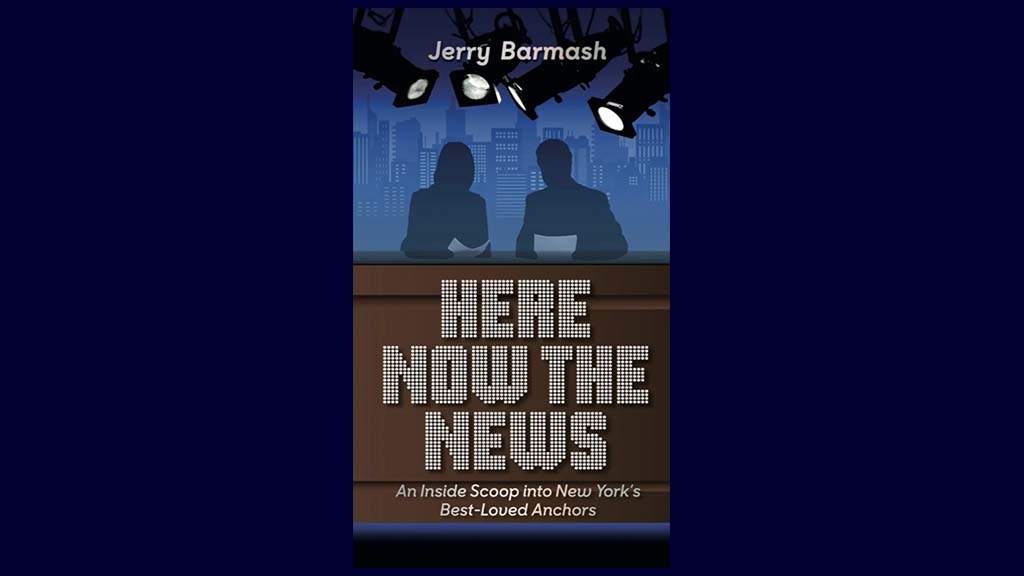
Jerry Barmash has published Here Now the News: An Inside Scoop into New York’s Best-Loved Anchors, a behind-the-scenes peek at the local TV scene in the largest market in the 1970s.
In the introduction, Barmash, a veteran media reporter who contributes to B+C, writes that the book “became much more than simply a book about broadcasting. It’s about egos, power, sexism, and racism. The names you’ll see in the pages that follow are stars of local news in New York City. However, their story plays on a large scale, and not just because of the exposure many of them got at the network level.”
Here Now the News begins at WCBS in the 1970s, checking in with anchors Rolland Smith, Dave Marash, Jim Jensen, Michele Marsh and others starting at the station. Jensen opened up about his drug use following the death of his son in an accident. “My temper would be short, and I wouldn’t be too consistent in the way I treated people,” Jensen said. “Sometimes I would be abrupt or I’d be silent. I started missing work. I’d miss family functions. You start to look a little seedy around the edges.”
Another chapter, called “There’s a New Girl in Town,” looks at Chuck Scarborough and Sue Simmons at third-place WNBC. Sports anchor Len Berman says, “They had a special thing going, but it was a different kind of show. They were doing a lighthearted chat show before chat shows were big.”
(Scarborough recently marked a stunning 50 years at WNBC.)
Women were slowly making their way to the anchor desk at the time, and minority women had a more difficult path. Howard Stern, for one, poked fun at Simmons. (His parody “Sue Simmons Hair” was sung to the tune of “Bette Davis Eyes.”)
Former WNBC anchor Jack Cafferty said Simmons was a standout anchor. “[Sue] has great street smarts and a sense of humor,” he said. “She speaks from the hip and is fun to watch.”
WABC next gets its close-up, as Barmash follows its path from also-ran to market leader. A key element of its rise was the Eyewitness News branding, and the on-air work of anchors such as Roger Grimsby and Bill Beutel. (Grimsby’s nightly introduction gave this book its title.)
Longtime WABC sound man Richard Sloan said of the anchor pair, “They had a chemistry, no doubt about it, Laurel and Hardy, Abbott and Costello.”
It was Al Primo who set up the Eyewitness News brand, and Primo is also singled out for injecting the concept of “happy talk” onto the set at WABC, and spreading throughout the country.
The book then details the arrival of Ernie Anastos and Tom Snyder to WABC, and later, Larry Kane, a notable Philadelphia anchor who commuted to New York to anchor the late news. Grimsby did not approve of the anchor living in another market. Traffic and weather at times affected his commute, such as the time Kane called in a live report from a car stuck in traffic at the Lincoln Tunnel.
Kane shares about Grimsby concluding the night’s news to viewers: “That was Larry Kane reporting from his exclusive limousine on the way from Philadelphia.”
Here Now the News moves onto WNEW (now WNYW) launching a 10 p.m. nightly newscast in 1967, with Bill Jorgensen as an anchor, and WPIX chipping away at the established players, too.
As the 241-page book winds down, Barmash looks at the rise of cable news and how it starts to affect the broadcast business. “CNN was born and the bastardization of the news industry would gradually follow,” he writes. “From Newsmax on the right to MSNBC on the left, a home for all political views means the fractured television audience can always find its information or disinformation.”
The independently published book is thoroughly reported and well-written. For those who worked in local broadcast in New York at the time, Barmash’s stories will surely hit home. For those who watched local broadcast in New York at the time, Here Now the News will offer a glimpse at what happened at the stations when the cameras were not rolling.







